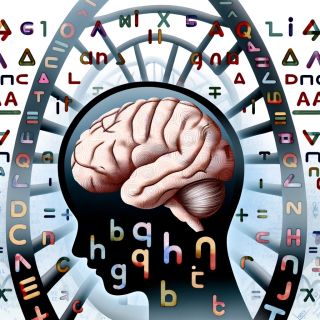Cognition
Behind Enemy Lines: My Deep Dive Into the Grammar Gene Debate
A Personal Perspective: How Liz Bates and Steven Pinker sharpened my view of language development.
Posted April 30, 2024 Reviewed by Abigail Fagan

At the end of the twentieth century, a battle over the soul of our cognitive abilities erupted. One camp argued very strongly that our ability to learn language was driven by an innate capacity for language. This genetic predisposition to language had gained such support that it made it to the NBC Nightly News, where Tom Brokaw declared that researchers had discovered “the gene for grammar.”
The idea that language is part of an innate language acquisition device was brought to prominence by Noam Chomsky. In a nutshell, Chomsky saw a very complicated language system, a baby born with very little language, and a sudden appearance of a very complex system at a young age. The grammar gene idea came about due to a freak discovery by a group of researchers headed by Myrna Gopnik, a famous Canadian developmental psychologist. Fate would have it that I would meet many of her students by chance at a conference that neither of us normally attended.
One day cognitive scientist Liz Bates showed up at my office in the laboratory, where I was busy working on some data analysis. She sat down and told me that there was a conference on aphasia, a language disorder due to stroke, that was taking place outside Montreal. It was two weeks long so there was no way she could go. She hated the idea of missing it. So she wanted to know if she could send me, as long as I promised to take a lot of notes. Hmmm, travel to Canada for the first time, stay at a conference, and meet all these important researchers. All of this in exchange for notes. I liked the deal and took it on the spot. Of course, the biggest bonus was that she had thought of me and not someone else to fill her shoes.
When I got off the plane, I headed to a bus that would take us on the hour-long ride outside the city. There I arrived at a house in the woods where the meeting would take place. This was 1994, so the world was just barely starting its wireless transcontinental connecting project. There was one wired phone for the entire house. Because the meeting venue was isolated and there was no TV and no Internet, the time off was spent speaking to other people.
At one gathering, I met a group of students from Canada. As we spoke, the students were surprised that I was getting along so well with them. Out of the blue one of the students asked me, “Did you know that our advisers hate each other?” I had no idea of this conflict. The reason for the strong disagreement would appear a little later in my trip.
I had heard Liz complain bitterly about a new book by Steven Pinker called The Language Instinct (Pinker, 1994). When I spotted one of the friendly students from the “enemy” camp reading it, I asked her what she thought about it. She told me it was a great book and that it featured the research by her adviser about a special family in England. According to the student, this family was perfectly normal. They were doctors, lawyers, and held other professional jobs. The only problem with them was that they could not produce the regular past tense. Instead of saying something like “I walked to the store yesterday,” they would say, “I walk to the store yesterday.” They could not add an -ed to the end of a verb to change it from the present to the past tense. This and other similar findings led researchers to conclude that the family had difficulty with grammatical rules.
When I heard about this family and about the money that was coming in to study the genetics behind their grammar problems, I began to wonder if there might actually be a grammar gene. Maybe there was an innate genetically determined scaffold that all humans use to learn grammar. The graduate students seemed very pleasant, and we were able to socialize without any conflicts. They admired their mentor just as much as I admired mine.
There was just one small problem. The view of language development as arising from genetically led learning was contrary to what I had experienced. I had been exposed to multiple languages as a child: Spanish and English from birth. Farsi for a year in home care. If learning language was just me digging out grammatical rules that were buried in my genes, how was it that I managed to learn and forget Farsi in a year? What about the fact that I had sung in Brazilian Portuguese as a child, and that eventually led me to native-like ability in that language? How could a perfectly elaborated plan be given to me genetically to handle such an imperfect set of language experiences? Never mind that Liz had said that language was “a new machine built out of old parts.” Basically, she held that language emerged from a lot of different systems that worked together to help us communicate with others.
Outside Montreal with all the views that had been baked into my thinking called into question, I was left with one basic question that would determine whether I had been brainwashed or seen the light. “Have you ever met any of these family members?” I asked a student. “No, but I have read all about them,” the student answered.
Seeing is believing, and if the student had not seen them in person, there was enough doubt in my mind to suspend judgment until further information was available. Liz might be wrong, but the word of a graduate student who was reporting things secondhand was not enough to convince me entirely. I had not seen this family myself, and that made me doubt whether it was all true. What I did know was what I had experienced as a child, and this did not fit in with a fixed set of grammar rules that are preprogrammed from birth. To me language was a lot more flexible than an instinct.
In a recent Lost Women of Science podcast, Samia Bouzid and Katie Hafner discuss how Liz Bates took on nativist views of language. This post is excerpted from my recently published book, Mastery: How Learning Transforms Our Brains, Minds and Bodies and describes an episode in which I came face to face with these views and found a way forward.
References
Bates EA, Benigni L, Bretherton I, Camaioni L, Volterra V. (1979). The emergence of symbols: Cognition and communication in infancy. New York, NY: Academic Press.
Pinker, S. (1994). The language instinct. William Morrow.




